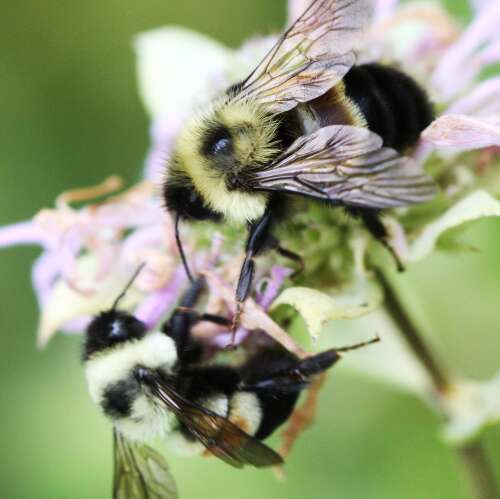A proposal to expand beekeeping activities in unincorporated DuPage County has sparked criticism from some environmentalists who fear an increase in the honeybee population would adversely affect native bees, including the rusty patched bumblebee.
Courtesy of Alma Schrage
Before DuPage County Board members loosen beekeeping restrictions, some groups want them to consider the sting those changes may have on native bees.
County board members recently delayed a vote that would have allowed beekeeping on smaller lots. Right now, beekeeping is allowed in unincorporated areas on lots that are an acre or larger.
The change would allow up to two honeybee colonies on the smaller lots and as many as four colonies on lots one acre and larger.
Allowing honeybees on smaller lots has created a buzz among beekeepers who support the change. However, some environmentalists fear an increase in honeybees will adversely impact native bees, including the endangered rusty patched bumblebee.
“If we increase the number of honeybees, then we decrease the food supply for the native bee population,” said Connie Schmidt, chair of the River Prairie Group of Sierra Club.
Beekeepers, however, say the shrinking habitat — not the honeybees — should be the concern and note that honeybees have shared space with other bees for hundreds of years.
“If resources are scarce for our pollinators, then shame on us, not shame on the pollinators,” Pete Soltesz, vice president of the Cook DuPage Beekeepers Association, told county board members last week.
Instead of penalizing beekeepers, he suggests the county look at ways to boost the natural habitat for bees and other pollinators.
County board members will host a joint session of the board’s environmental and development committees at 11:30 a.m. Tuesday to discuss the concerns and the proposed zoning code change.
Board member Patty Gustin noted that several municipalities, including Naperville, already allow beekeeping on smaller lots within city boundaries.
“The unfortunate thing is that it seems so unfair and biased, to some degree, against our unincorporated residents who have to have an acre or more to have a beehive,” she said of the existing code.
The county has cited five beekeepers — all located on lots smaller than one acre — for noncompliance with the county’s existing code.
Gustin said the proposed change would bring those residents in compliance and allow the county to keep better track of beekeeping activities.
“I know there are people who are against this, but I think it’s important for us to know where these hives are if there is ever an issue,” said county board member Sheila Rutledge, who heads the environmental committee.
Rutledge said she hopes a deeper discussion about pollinators will spark interest and awareness in boosting natural habitats.
“Turf grass is an environmental wasteland,” she said. “I’d like to see more native planting that would benefit the native bees.”
No final decisions are expected on Tuesday. Any changes in the zoning code will have to be approved by the county board at a later date.
